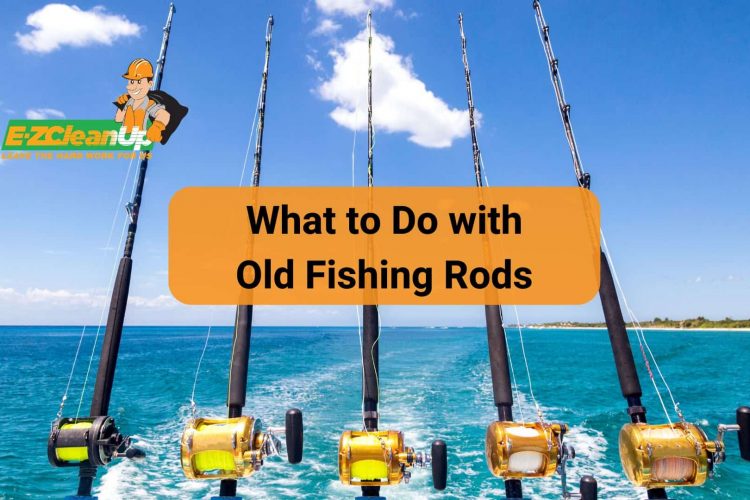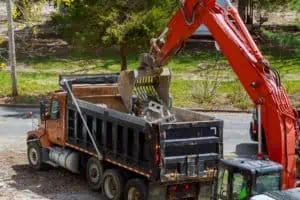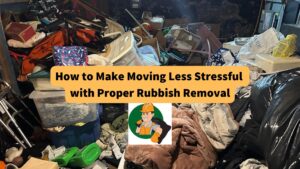To manage old fishing rods, consider upcycling them into decor or practical tools, donating them to community programs or schools for reuse, or checking for recycling options to minimize environmental impact. Each approach contributes to sustainability and extends the usefulness of the gear.
If you want to know more about what to do with old fishing rods, read on.
Options for Repurposing Old Fishing Rods
Thoughtfully disposing of or recycling old fishing rods has several benefits. Here’s a quick look at some ideas to give your old fishing gear a new lease on life.
DIY Projects and Crafts
Transforming old fishing rods into DIY projects and crafts is not only a fun activity but also an effective way to reduce waste. Here are some ideas on how you can upcycle the materials:
- Decorative and Functional Use: Fishing rods can serve as charming decor items. You can mount vintage rods directly onto walls to give space a rustic flair or use them to accentuate wall hangings.
- Shelter Rods: You can turn old fishing rods into outdoor shelters. This can be particularly useful for those who enjoy crafting their own makeshift shelters while engaging in outdoor activities.
- Spare Parts for Repair and Projects: For handy and creative individuals, old fishing rods and reels can be a goldmine of spare parts. Whether for repairing current gear or undertaking new projects, these parts can breathe new life into your fishing equipment.
- Craft a Unique Coat Rack: This project involves cutting the rods to a suitable length and mounting them vertically on a sturdy base.
- Wall Art from Broken Pieces: Broken fishing rods need not be discarded. The pieces can be assembled into a fascinating piece of wall art. With some creativity, glue, and a frame, you can create a decorative piece that pays tribute to the joys of fishing.
- Garden Stakes or Flag Poles: Repurpose broken fishing rods as stakes for supporting plants in your garden or as unique flag poles.
- Jewelry Making: The smaller components of fishing rods can be turned into unique jewelry items, such as earrings and necklaces.
- New Tools Creation: The inventive repurposing of fishing rod parts into tools, like clippers or knife sharpeners, showcases the versatility of these materials.
Donations to Community Programs or Schools
Donating your old fishing rods to community programs, schools, or organizations that offer fishing activities is a wonderful way to support others while decluttering. Many programs appreciate the donation of fishing equipment to help introduce the sport to individuals who might not otherwise have the opportunity.
By donating, you contribute to the enjoyment of fishing and support initiatives that benefit both the fishing community and the environment.
What Can You Do with a Broken Fishing Rod
Don’t rush to dispose of a broken fishing rod. There are several constructive steps you can take to give your rod a new lease on life or manage its parts responsibly.
Repairing If Possible: Tips and Techniques
Repairing a broken fishing rod is often simpler and more rewarding than you might think. For instance, a broken rod tip, the most common type of break, can be easily and affordably fixed, usually without significantly affecting the rod’s performance. Most tackle supply stores and online retailers offer guide tip repair kits, which include various tip sizes and the necessary glue.
For more severe damages, such as breaks along the rod blank, creating an insert from an old rod of similar size can restore the rod’s integrity. This process involves using epoxy to bind the broken pieces together, then reinforcing the area with rod winding thread and a protective coat of Flexcoat for durability.
Salvaging Parts for Future Use or Repairs
Don’t overlook the value of salvaging parts from a broken rod for future repairs. Guides that are still in good condition can be removed and stored for later use. Similarly, handles and reel seats that are not damaged can be repurposed.
Environmentally Safe Disposal of Unrepairable Parts
When parts of the rod are beyond repair or salvage, responsible disposal is crucial. Contact local recycling centers or waste management services to inquire about their policies on fishing gear. Some materials, like certain plastics and metals, can be recycled, while others may require special disposal methods to prevent environmental harm.
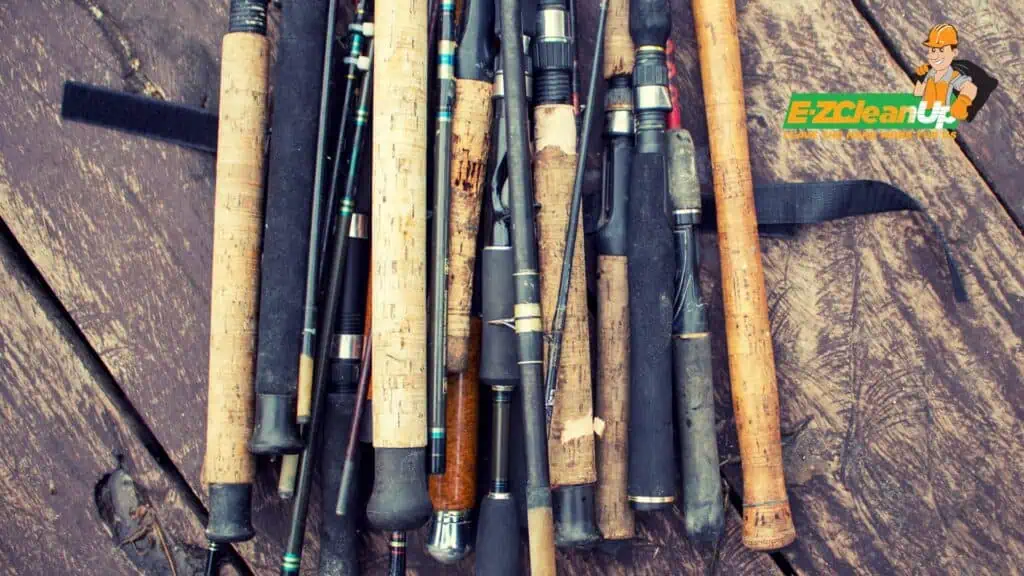
Disposal Solutions for Unsalvageable Fishing Rods
For those wondering about sustainable and creative ways to dispose of unsalvageable fishing rods, here are some of the options available.
Recycling Options and Facilities
Recycling your old fishing rods is a responsible way to ensure they don’t end up in landfills. Some components of fishing rods, like metal guides and reel seats, can be recycled into new products.
To find a local recycling center that accepts fishing rods, you might need to do a bit of research. Start by checking with your city or county’s recycling program, as they often accept a wide range of materials. Additionally, tackle shops and specialty recycling centers may be able to point you in the right direction or even accept the rods themselves.
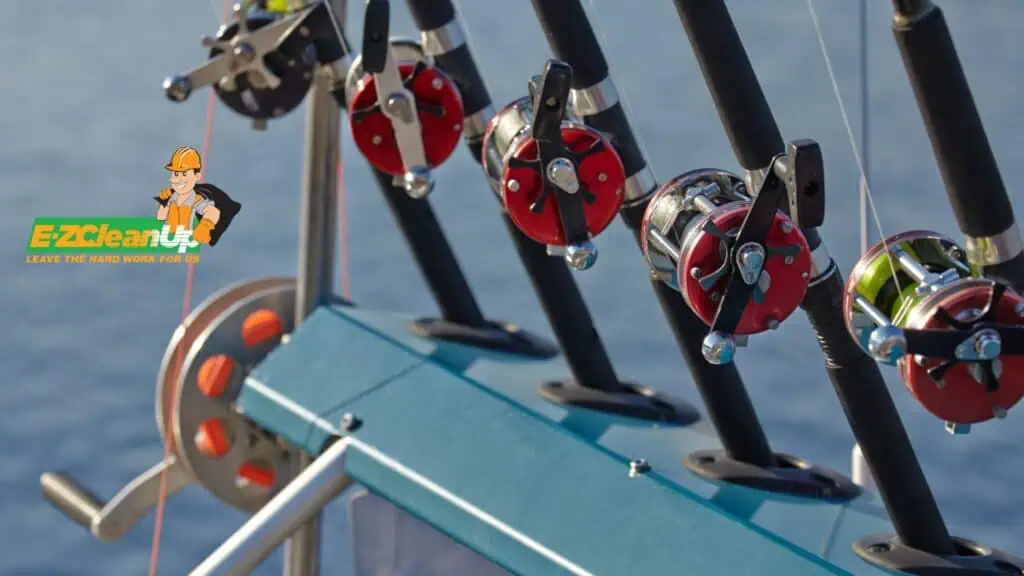
Specialized Waste Management Services
Not all waste management services can handle fishing rods due to their unique materials and construction. However, specialized services exist that deal specifically with sports equipment or hard-to-recycle items.
Reaching out to your local waste management authority or searching for “sports equipment recycling” online could provide options. Some municipalities also host special recycling events for items not typically accepted in curbside recycling programs.
Manufacturer Take-Back Programs
Many fishing rod manufacturers are beginning to recognize the importance of sustainability and offer take-back programs. These programs allow consumers to return their old or broken rods directly to the manufacturer for recycling or responsible disposal.
Check the website of your rod’s manufacturer or contact them directly to see if such a program is offered. Participating in these programs not only ensures that your old gear is disposed of correctly but also supports companies taking steps toward environmental responsibility.
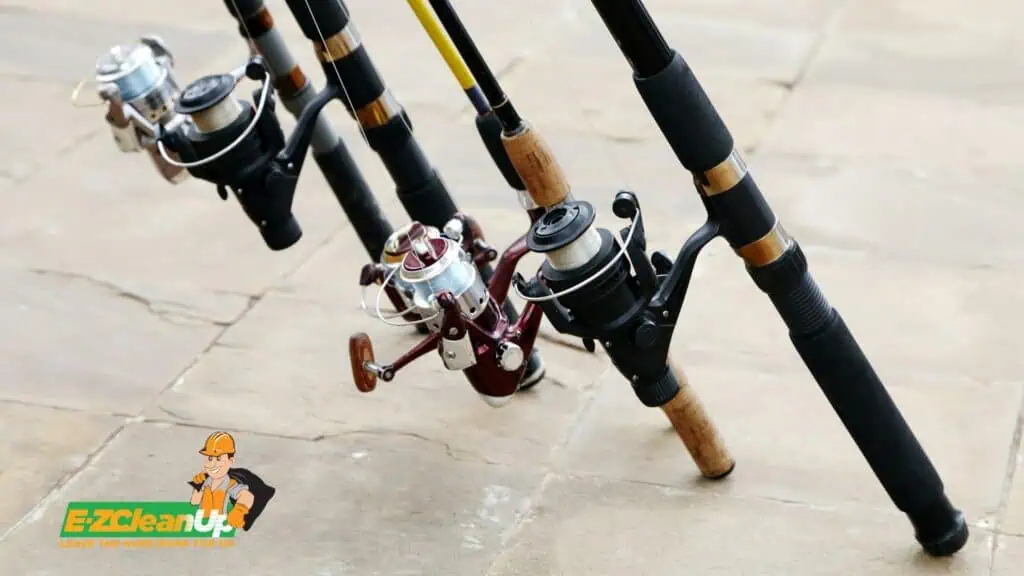
Preparing Old Fishing Rods for Disposal or Repurposing
Managing old fishing rods in an environmentally friendly manner involves a few key steps. It’s not just about decluttering; it’s about giving these items a second life or ensuring they are disposed of responsibly.
Assessing Condition: Repairable, Broken, or Wear-Out
Start by evaluating the condition of your fishing rods. If they’re simply worn but still usable, consider donating them to organizations that can put them to good use. Organizations often refurbish fishing gear to provide it to those who cannot afford new equipment.
However, if your rod is broken beyond repair, it might still have a second life through upcycling or proper recycling.
Cleaning and Dismantling for Disposal or Recycling
Before disposing of or recycling your fishing rods, clean and dismantle them. This might involve removing any hooks, lures, or line still attached to the rod.
If recycling, separating the metal components, such as guides and reel seats, can be beneficial since many recycling centers or scrap yards accept metal. Proper cleaning and dismantling ensure that the rod is ready for its next stage, whether it be recycling or repurposing.
Identifying Materials: Composite, Fiberglass, or Bamboo
Fishing rods made from bamboo or wood offer more eco-friendly disposal options and can be repurposed in creative ways. Composite and fiberglass rods, while not biodegradable, can be dismantled for parts or recycled for their metal components.
Some creative repurposing ideas include using rods as garden stakes, decor, or even crafting them into new tools or art pieces.
Best Practices for Sustainable Fishing Hobby
Embracing a sustainable fishing hobby not only enhances the joy of fishing but also ensures our waterways and natural habitats remain vibrant and healthy for generations to come. Here are some best practices to help you maintain this balance:
Maintenance Tips to Extend Rod Life
Proper rod maintenance can significantly extend the life of your fishing rods. Start by cleaning your rod with mild soap and warm water, using a soft-bristle brush to gently remove dirt from all parts, especially around the guides and reel seat.
Inspect your rod for any signs of wear or damage, including checking the rod guides for wear and damage using the Q-tip test. If cotton frays when twisted inside the guide, it indicates damage.
Also, ensure the reel is kept clean and lubricated, and store your rods in a cool, dry place, ideally in rod sleeves or cases to prevent damage during transportation.
Making Eco-Friendly Choices in Fishing Gear
Choosing eco-friendly fishing gear begins with selecting durable and repairable equipment. Opt for rods and reels that offer repair services or replacement parts to avoid complete replacements.
Silicon carbide or titanium carbide rod guides, for example, are strong and reduce line friction, which makes them less likely to chip or crack. Additionally, consider biodegradable fishing lines and lures, and avoid single-use plastics by using reusable containers for your baits and tackles.
Engaging in Community Clean-Up and Recycling Initiatives
Participation in community clean-up events not only helps to preserve natural habitats but also fosters a sense of community among anglers. Engage with local fishing clubs or conservation groups to participate in or organize clean-up days along your favorite waterways.
Recycling old fishing gear is also crucial. Many tackle shops offer recycling programs for fishing lines and other gear. By properly disposing of or recycling your old equipment, you contribute to reducing environmental pollution and ensuring the sustainability of our fishing practices.

Tackling the Clutter: Expert Removal of Unwanted Fishing Rods
For fishing enthusiasts, old rods accumulate over time, which can turn into clutter that’s hard to tackle. Whether it’s due to upgrades, wear and tear, or simply a change in hobbies, the question of what to do with old fishing rods can be as tricky as landing a big catch.
EZ CleanUp recognizes these challenges and offers a specialized approach to removing unwanted fishing gear. Our expertise extends beyond simple junk removal; we focus on sustainable practices that respect the environment while providing you with a clear, clutter-free space.
Call us if you need professional help for junk removal and other services, such as cash for junk cars, yard cleanup, and more.

